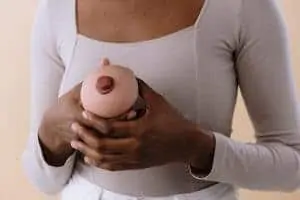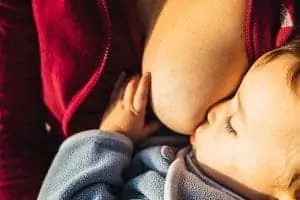Nothing is more frustrating than when your baby latches and unlatches repeatedly. Popping on and off of the boob can be annoying and worrisome all at the same time.
I don’t mean a new baby struggling to learn how to latch and breastfeed during the first weeks of life. That’s entirely normal, and while it’s a bit frustrating, it also goes away and improves with time. A baby popping on and off also doesn’t refer to your baby, who isn’t latching at all. If your baby cannot latch onto your breast and stay there for five strong sucks, that means your baby cannot latch.
While it might be annoying for you, your baby isn’t doing it to play games (unless you have a toddler who thinks breastfeeding is the perfect time to be goofy). There are several reasons why your baby latches and unlatches while nursing. Let’s take a look!
6 Reasons Why Your Baby Latches and Unlatches
A Bad Latch
All babies, at times, latch on wrong; that’s normal. Whether it’s how you’re holding them or just a bad day, a bad latch can happen at any time. Your baby might realize he latched wrong and readjust to get a better milk flow.
However, if you notice this is a consistent problem, your baby might have difficulty getting a correct latch. That’s a sign that you must visit a lactation consultant to figure out the unlying problem.
You Have a Strong Letdown
When your baby first latches onto your breast, he has to suckle a little faster than usual to help stimulate your letdown. A letdown is just what it sounds like; it’s when your breast lets down your milk.
If you notice your newborn latching on and off, choking, or coughing, it could be because your initial milk flow is too fast for your baby. He’ll naturally unlatch to control how much milk ends up in his mouth, but since he’s still hungry, he returns for more.
But what can you do about your strong letdown?
While you can’t tell your breasts to chill out, you can try a few tricks to help make your letdown a little easier for your baby to handle.
- Try pumping just a bit before nursing. You don’t want to remove too much milk, but you want to skip the part when milk shoots out everywhere at once.
- Lean back when you’re breastfeeding. Instead of having your baby in your arms with your breasts above him, lean back, especially if you have a recliner, and let your baby be on top of your breasts. That way, milk can easily flow back out of the sides of his mouth instead of your baby having to pop off.
A Lack of Milk
Another issue is that you might not have enough milk, but stop – don’t stress. That doesn’t mean you have a low milk supply. It means that your baby isn’t getting as much milk as he would like at that moment, but that doesn’t indicate a supply issue.
Remember that…
If your baby is latching and unlatching due to a lack of milk, they usually start with pushing their head toward your breast, then pulling back on your nipple. It’s almost like they’re trying to draw milk out of your breasts, and then your baby will pop off.
While yes, this can be uncomfortable, babies are smart, and they realize that pulling and sucking at the same time can give them more milk, and they want to fill their bellies!
Before you assume you have a low milk supply, you should know several reasons why you might not make enough milk at any given time. Here are a few of those reasons.
It’s Later in The Day
You have the most milk when you wake up in the day. If you’re trying to build a freezer stash, pumping in the morning is the best time. It’s quite common for you to have a frustrated baby in the evening, but that doesn’t mean your baby will be unsatisfied.
Your milk volume is lower at night but higher in fat, so your baby will get full on less milk. To keep your baby happy, you might have to deal with this issue or try switching from breast to breast until he calms down.
You Pumped Recently
If you pump too close to when your baby needs to breastfeed, it can cause your baby to be frustrated. The recommendation is to pump within 15 minutes after nursing to give your breasts time to refill.
Your Baby Has a Tongue or Lip Tie
Having a tongue or lip tie is quite common; you should always have it checked by your pediatrician or an IBCLC. Pediatricians have been known to miss them because they aren’t trained in breastfeeding.
A tongue or lip tie makes it harder for your baby to suckle. He can’t latch correctly, making it hard to get enough milk out! Try the flipple technique.
It’s Your Slacker Boob
Everyone has a slower breast or a slacker boob. It might have a slower flow of breast milk than your other breast, and if your baby is hungry and not patient, he might start to pop on and off due to frustration.
Now, it’s true; you could have a low milk supply. However, you can’t determine that by a baby popping on and off or even fussiness at the breast. Instead, you have to look at two things:
- Number of wet & dirty diapers
- Your baby’s weight gain
If your baby is gaining weight and sticking to his curve (pediatrician checked) and has the appropriate number of wet and dirty diapers each day, then you more than likely don’t have a milk supply issue.
Belly Aches and Gassiness
If your baby keeps unlatching during breastfeeding, it could be because he’s uncomfortable. Bellyaches or gassiness are two main culprits of discomfort, but they’re not the only source that could cause popping on and off.
One of the first things you can try is to burp your baby. A trapped burp can lead to a stomachache, or you can try to bicycle his legs if you think gassiness might be the problem. Gas drops are also effective at relieving some tummy pains.
A few other culprits could be:
- Colic
- Reflux discomfort
- Constipation
Distractions Are Everywhere!
When you find your older baby latching and unlatching repeatedly, it might be because the world is an exciting place to be now. Noises and things are happening that are way more exciting than nursing.
Sure, babies love milk, and they’ll usually pick boobs over anything else, but they also think their siblings are super funny. They love it when their dad or grandma walks into the room, and they love it when the dog shakes his toy everywhere.
Finding out that your baby is engaged and enjoying his surroundings is a good sign, but it can be make breastfeeding sessions a bit harder. Try moving into a quiet room away from the rest of the family.
He’s Comfort Nursing
Believe it or not, babies can nurse for comfort rather than breast milk. It’s all about how they suckle, but if your breasts decide to let down while your baby is comfort nursing, he might start to pop off because he wants to relax and not eat.
What to Do If Your Baby Latches and Unlatches Repeatedly
If your baby does this sometimes, it could be a simple latch issue or a bit of gas. These things happen; babies have bad days just like we do. If popping on and off is a regular daily occurrence, here’s what you should do.
Burp Your Baby More
The first thing you should do is start to burp your baby more often. Trapped burps can make your baby feel uncomfortable, so as soon as he starts to pop on and off, try burping.
Check for Tongue or Lip Ties
Tongue and lip ties can cause a lot of problems. Not only does it mean your baby might not get enough milk, but it also increases gassiness problems. Babies tend to struggle with a proper latch and intake more air than they should.
You can have tongue or lip ties clipped or lasered; the effects are typically immediate!
Try Different Positions

The positions that you’re using might not work for your baby. If you suspect a fast letdown, try the leaning-back position. Your baby might struggle to get the right latch, so trying different positions can help you determine what the issue is for your baby.
Change Locations
If you suspect that your child is distracted while nursing, change locations! You might need to step away from the other kids in your home or turn off the TV.
Check Your Diet or Try Gas Drops
If your baby has frequent gas, that means something is going on and needs to be addressed. Using gas drops can help, but if your baby needs gas drops every day, it means something is causing the gassiness.
Take a look at your diet. Are you eating foods that could cause gassiness? Keeping a food diary can help you identify gassy periods and what foods you ate prior. Some mothers must cut out a range of foods to decrease stomach discomfort.
Consult a Lactation Consultant
If all else fails, contact a local lactation consultant and make an appointment to receive help. Your baby should not repeatedly pop on and off the breast at each nursing session. It’s an indicator of a problem, but don’t worry, all issues can be fixed.
Final Thoughts
While it can frustrate or irritate you when your baby latches and unlatches repeatedly, there is always a reason for this behavior. Pinpointing the cause and solving the problem will help make breastfeeding a positive experience for everyone.
Hey, this is Linda. My biggest accomplishment in life is being a mother of four children. Their current ages range from almost ten years old down to 20 months old.
I’m passionate about writing parenting articles because I understand so well all of the problems and trials you face as a parent. From breastfeeding woes to budgeting problems and behavior problems, along with everything in between, chances are I’ve faced it over the last ten years. Read more about Linda here.




![How to Succeed at Deep Latch Breastfeeding with Tips [Graphics and Videos to Help] baby tries deep latch](https://kidslymom.com/wp-content/uploads/2021/11/Deep-latching-300x200.webp)

